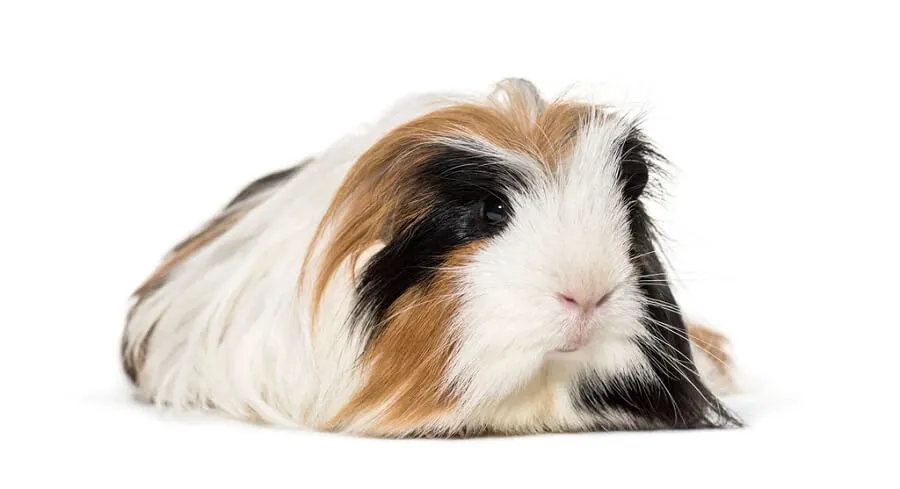The Coronet Guinea Pig is a social and affectionate breed, known for its long, flowing hair and the distinctive ‘coronet’ or rosette of hair on its forehead. These qualities make the Coronet a visually striking and endearing pet.
Origins and Distinctive Features
Coronet Guinea Pigs are distinguished by their unique hairstyle, with most of their hair flowing backward towards the tail and a characteristic swirl or ‘coronet’ on their head. They are one of the 13 breeds recognized by the American Cavy Breeder’s Association.
To learn more about other guinea pig breeds visit A Guide to Guinea Pig Breeds: Finding Your Perfect Match.
Physical Characteristics
- Size: Male Coronet guinea pigs are larger than females. They are generally small in size but require space due to their long hair.
- Coat Type: Their coat is long and requires daily grooming to prevent matting and tangling.
- Color Variations: Coronets come in various colors and patterns.
Temperament
Coronet Guinea Pigs are known for their gentle and social nature. They usually prefer the company of another guinea pig and can live peacefully in same-sex pairs if introduced at a young age.
Pros and Cons
Pros:
- Social and gentle, making them great companions.
- Visually striking with a unique and beautiful long coat.
Cons:
- Require extensive daily grooming due to their long hair.
- More susceptible to heat due to their long coat, requiring careful temperature regulation.
- May require professional grooming services.
Lifespan
With proper care, Coronet Guinea Pigs typically live about 4-6 years. Proper diet, grooming, and living conditions can extend their lifespan.
Care Requirements
- Grooming: Daily grooming is essential. Combing is required to prevent matting and tangling. Regular baths and professional grooming every 4-6 weeks are often necessary.
- Diet: Provide a diet of hay, guinea pig pellets, and fresh fruits and vegetables rich in Vitamin C. Ensure constant access to fresh water.
- Exercise Requirement: Provide time outside the cage in a safe and supervised area for exercise. They enjoy interacting outside their enclosure.
- Housing: Require a spacious cage with solid flooring, bedding, hiding boxes, and enrichment items. The cage should be placed in a safe location away from drafts, other pets, and small children.
- Health Considerations: Watch for common health conditions like inner ear infections, fungal infections, respiratory infections, GI stasis, scurvy, skin and mammary tumors, and bladder and kidney stones. Regular veterinary check-ups are crucial.
Where to Get One
- Rescue Centers: Adoption from rescue centers is encouraged, offering a loving home to a pet in need.
- Reputable Breeders: Choose breeders who are knowledgeable about the breed and provide healthy, well-cared-for guinea pigs.
Interesting Fact
Despite their regal appearance, Coronet Guinea Pigs are relatively new in the world of guinea pig breeds, having been developed in the 1970s. However, they have quickly gained popularity due to their distinctive look and affectionate nature.

